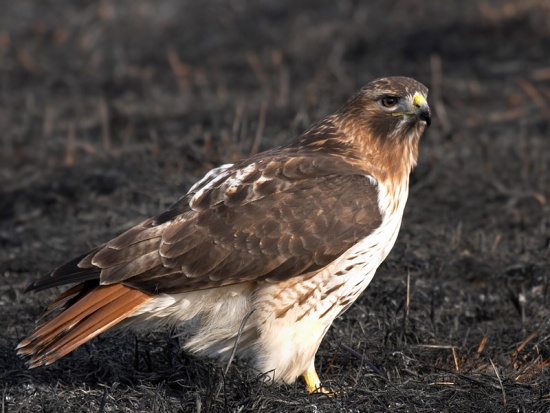- Buteo jamaicensis
Identification
- Large, stocky hawk
- Whitish breast with dark band
- Rusty tail
- Dark leading edge on wing (Seen during flight)
Immature
- Duller
- More streaked
- Lack rusty tail
- Light brown tail with some dark barring
Similar Species
Told apart from Red-shouldered Hawk and Swainson's Hawk by their white chest, stocky build, and broader, more rounded wings.
This species is quite variable in colour, especially in the West, where blackish individuals occur; these often retain a rusty or reddish tail. One of the most diagnostic field marks is the "cumberbund"; an area on the upper belly that is usually darker than the rest of the underbody.
Distribution
Year-round over most of the U.S. and Mexico; summers northward throughout the Canadian Provinces and insland Alaska.
Taxonomy
Five races: Krider's (krideri) is a pink-tailed Great Plains race; borealis in the east, fuertesi in the Southwest, calurus in the west, and Harlon's Hawk, harlani, a very dark morph easily confused with the Swainson's Hawk.
Habitat
The most common hawk on the NA continent, B. Jamaicensis frequents woodland edges, soars above plains, is often seen perched on utility poles where natural perches are not available.
Behaviour
Diet
Soars or perches, looking for a wide variety of food; small to medium mammals, lizards, frogs, worms, insects, bats, and small birds.
Breeding
Monogamous.
Conservation Status
Common and plentiful, some decline due to habitat loss, although it adapts relatively easily to new environments, even urban. Many are still shot illegally for amusement.





